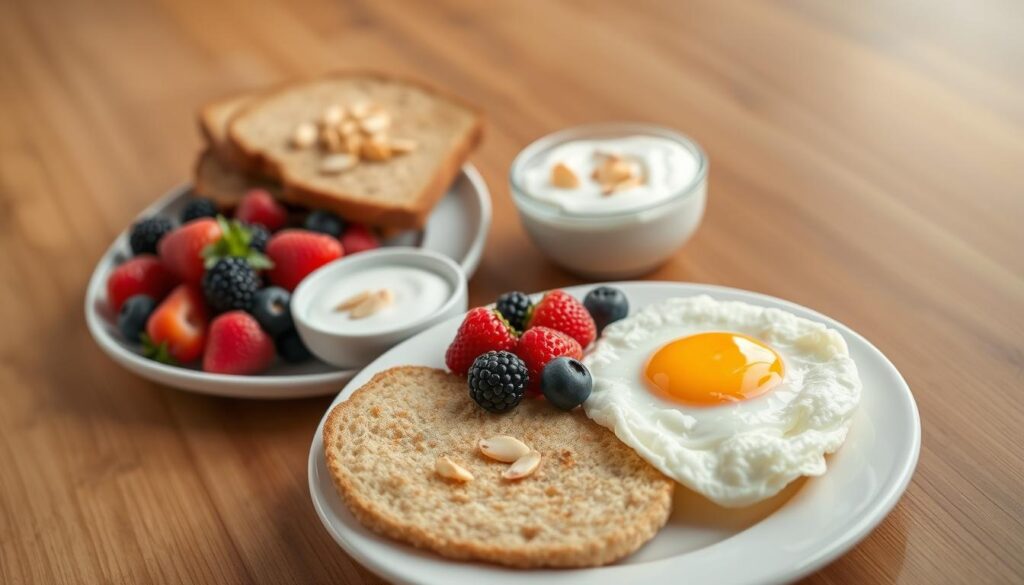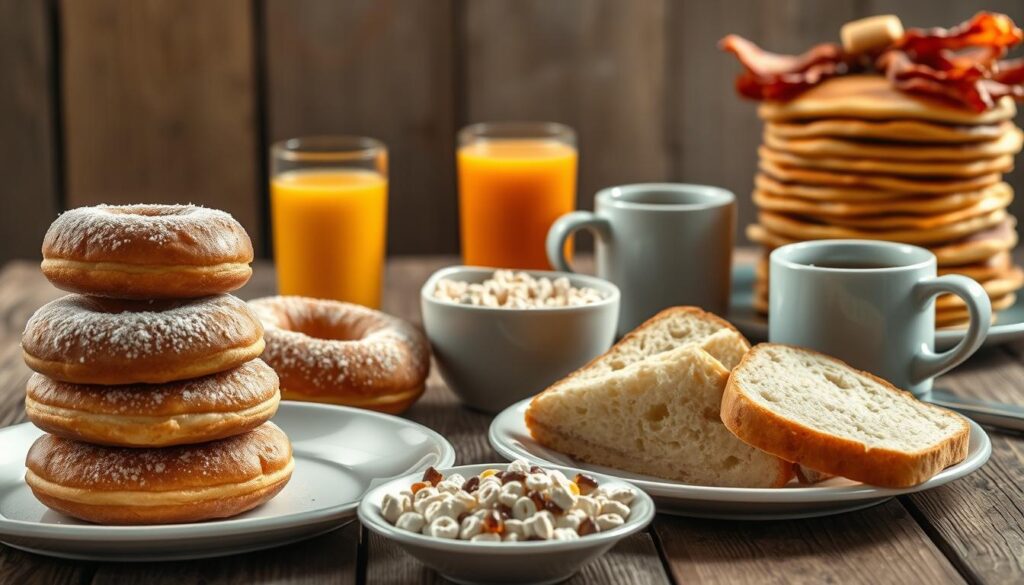What to Eat for Breakfast to Have More Energy
Starting your day with the right breakfast can significantly impact your energy levels. A well-balanced breakfast provides the necessary fuel for your body and brain, helping you tackle daily tasks with vigor.
Incorporating energy-boosting breakfast foods into your morning routine can make a substantial difference. Choosing healthy breakfast options like whole grains, fruits, and lean proteins can help you feel more alert and focused throughout the day.
By focusing on morning nutrition, you can set yourself up for a day filled with productivity and energy.
Key Takeaways
- Including whole grains in your breakfast can provide sustained energy.
- Eating fruits in the morning can help boost your vitamin intake.
- Lean proteins like eggs and Greek yogurt support muscle health.
- Avoiding sugary cereals can prevent energy crashes later.
- Staying hydrated with water or milk is crucial for morning nutrition.
The Science Behind Breakfast and Energy Levels
The connection between breakfast and energy is rooted in science, and grasping this relationship can revolutionize your morning routine. Breakfast is more than just a meal; it’s a crucial step in replenishing your energy stores after an overnight fast.
How Breakfast Affects Your Metabolism
Consuming breakfast jumpstarts your metabolism, helping your body transition from a fasting state to an active state. This metabolic shift is essential for energy production throughout the day.
The First Meal’s Impact on Blood Sugar
Eating breakfast helps regulate your blood sugar levels. A balanced breakfast can:
- Provide a steady release of glucose into the bloodstream
- Prevent sudden spikes in blood sugar
- Support sustained energy levels
Kickstarting Your Body’s Energy Production
Breakfast kickstarts your body’s energy production by replenishing glycogen stores and supporting the production of ATP (adenosine triphosphate), the energy currency of your cells.
The Connection Between Food and Mental Alertness
The food you eat for breakfast has a direct impact on your mental alertness and cognitive function. Nutrients from your breakfast are used to fuel your brain and support mental performance.
Brain Fuel: Glucose and Cognitive Function
Glucose is a primary fuel source for your brain. Consuming complex carbohydrates at breakfast provides a sustained release of glucose, supporting cognitive function and:
- Enhancing concentration and focus
- Improving memory
- Boosting mental clarity
Neurotransmitters and Breakfast Nutrients
Breakfast nutrients play a crucial role in neurotransmitter production, which affects your mood, motivation, and overall mental well-being. Key nutrients include:
- Amino acids (e.g., tyrosine, tryptophan)
- Omega-3 fatty acids
- Vitamins and minerals (e.g., B vitamins, magnesium)
By understanding the science behind breakfast and energy levels, you can make informed choices about your morning meal to optimize your energy and mental performance.
Protein-Rich Breakfast Options for Sustained Energy
Starting your day with a protein-rich breakfast can significantly boost your energy levels. Protein takes longer to digest than carbohydrates, which helps in maintaining a steady energy supply throughout the morning. Incorporating the right protein sources into your breakfast can make a significant difference in how you feel and perform throughout the day.
Eggs and Their Complete Protein Profile
Eggs are an excellent source of protein and are considered a complete protein because they contain all nine essential amino acids that your body needs. This makes them an ideal breakfast choice for sustained energy.
Preparation Methods That Preserve Nutrients
To maximize the nutritional benefits of eggs, it’s essential to prepare them using methods that preserve their nutrients. Boiling or poaching eggs are excellent ways to retain their protein and vitamins.
Combining Eggs with Energy-Boosting Foods
Combining eggs with other energy-boosting foods can enhance their benefits. For example, having eggs with spinach and whole-grain toast provides a balanced mix of protein, vitamins, and complex carbohydrates.
Greek Yogurt and Cottage Cheese Benefits
Greek yogurt and cottage cheese are other high-protein breakfast options that can help sustain your energy. They are rich in protein and contain probiotics that support gut health, which is linked to overall energy levels.
Plant-Based Protein Sources for Morning Energy
For those following a plant-based diet, there are numerous protein-rich foods that can be included in breakfast. Tofu, tempeh, legumes, and beans are excellent sources of protein that can be incorporated into morning meals.
Tofu and Tempeh Breakfast Ideas
Tofu and tempeh can be used in a variety of breakfast dishes. Scrambled tofu with vegetables or tempeh hash with sweet potatoes are delicious and energizing options.
Legumes and Beans in Morning Meals
Legumes and beans are not only rich in protein but also in fiber, making them very filling. Including them in your breakfast can be as simple as adding black beans to your omelette or having a bowl of lentil soup.

| Protein Source | Protein Content (per serving) | Energy Benefits |
|---|---|---|
| Eggs | 6-7 grams per large egg | Complete protein for sustained energy |
| Greek Yogurt | 20 grams per 1 cup serving | High protein for muscle support and energy |
| Cottage Cheese | 28 grams per 1 cup serving | Rich in protein for prolonged energy |
| Tofu | 20 grams per 3 oz serving | Plant-based protein for energy |
| Tempeh | 15 grams per 3 oz serving | Fermented protein for gut health and energy |
By incorporating these protein-rich foods into your breakfast, you can enjoy sustained energy throughout the morning and support your overall health and well-being.
Complex Carbohydrates That Fuel Your Morning
Starting your day with complex carbohydrates can significantly boost your energy levels. These carbohydrates are rich in fiber, vitamins, and minerals, making them an excellent choice for breakfast.
Whole Grains and Their Energy-Boosting Properties
Whole grains are an excellent source of complex carbohydrates. They contain all three parts of the grain: bran, germ, and endosperm, providing a rich source of fiber, vitamins, and minerals.
Quinoa, Buckwheat, and Ancient Grains
Quinoa and buckwheat are considered ancient grains and are known for their high protein content and energy-boosting properties. Incorporating these grains into your breakfast can provide sustained energy throughout the morning.
Whole Grain Breads and Cereals Worth Choosing
When selecting whole grain breads and cereals, look for products that are high in fiber and low in added sugars. Some good options include whole wheat bread, oatmeal, and whole grain cereals.
| Whole Grain | Energy-Boosting Properties |
|---|---|
| Quinoa | High in protein and fiber |
| Buckwheat | Rich in antioxidants and minerals |
| Oats | High in fiber and sustained energy |
Oats: The Ultimate Breakfast Staple
Oats are a popular breakfast choice due to their high fiber content and ability to provide sustained energy. There are several types of oats, each with its unique benefits.
Different Types of Oats and Their Benefits
Steel-cut oats, rolled oats, and instant oats are the most common types of oats. Steel-cut oats are less processed and retain more of their fiber content, while rolled oats are easier to cook.
Creative Oatmeal Combinations for Energy
You can enhance your oatmeal with fruits, nuts, and seeds to increase its energy-boosting properties. Try adding berries, banana slices, or almond butter to your oatmeal.
Fruits That Provide Natural Energy
Fruits are a natural source of energy due to their high content of simple carbohydrates, vitamins, and minerals. Incorporating a variety of fruits into your breakfast can help sustain your energy levels.
Berries and Their Antioxidant Power
Berries such as blueberries, strawberries, and raspberries are rich in antioxidants and can help protect against oxidative stress.
Tropical Fruits for Morning Vitality
Tropical fruits like mangoes, pineapples, and papayas are not only delicious but also packed with vitamins and minerals that can help boost your energy.
Healthy Fats to Include in Your Morning Meal
Healthy fats are a crucial component of a balanced breakfast, providing sustained energy and supporting overall health. Incorporating the right fats into your morning meal can help keep you full and focused throughout the day.
Avocados and Their Energy Benefits
Avocados are an excellent source of healthy fats, rich in monounsaturated fats that support heart health and provide a feeling of fullness. Adding sliced avocado to your breakfast toast or blending it into a smoothie can be a delicious way to boost your energy.
Nuts and Seeds for Breakfast
Nuts and seeds are not only crunchy and flavorful but also packed with healthy fats and protein. They make for a great breakfast topping or snack on their own.
Chia, Flax, and Hemp Seeds
Chia, flax, and hemp seeds are particularly beneficial, offering a rich source of omega-3 fatty acids and fiber. You can easily incorporate them into your breakfast by sprinkling them on oatmeal or yogurt.
Nut Butters and Their Applications
Nut butters, such as peanut butter and almond butter, are another tasty way to add healthy fats to your breakfast. Spread them on whole-grain toast or use them as a dip for fruit.
Omega-3 Rich Foods to Start Your Day
Including omega-3 rich foods in your breakfast can help support brain health and reduce inflammation. Walnuts, chia seeds, and flaxseeds are all excellent choices.
To incorporate these healthy fats into your morning routine, try the following list of ideas:
- Add sliced avocado to your omelette or toast
- Sprinkle chia or flax seeds on your oatmeal or yogurt
- Use nut butters as a dip for apple slices or as a spread on whole-grain toast
- Mix walnuts or other nuts into your breakfast cereal or oatmeal
By incorporating these healthy fats into your breakfast, you’ll be able to maintain your energy levels and support your overall health throughout the day.
What to Eat for Breakfast to Have More Energy Throughout the Day
To boost your energy throughout the day, it’s essential to understand the components of a balanced breakfast. A well-crafted morning meal sets the tone for your energy levels and productivity.
Balanced Breakfast Plate Formula
Creating a balanced breakfast involves more than just picking any food; it’s about achieving the right mix of nutrients. This balance is key to sustaining your energy.
The Ideal Macronutrient Ratio
A balanced breakfast should include a mix of carbohydrates, proteins, and fats. Aim for a ratio that includes complex carbohydrates for sustained energy, protein to build and repair muscles, and healthy fats for brain function and satisfaction.
- Carbohydrates: Whole grains like oats, quinoa, or whole wheat bread provide sustained energy.
- Protein: Include eggs, Greek yogurt, or nuts to support muscle health and satisfaction.
- Fats: Avocados, nuts, and seeds are excellent sources of healthy fats.
Color and Variety for Maximum Nutrition
Incorporating a variety of colors on your plate ensures you’re getting a range of vitamins and minerals. Different colors represent different nutrients, so a colorful breakfast is a nutritious one.

Portion Sizes for Optimal Energy
Understanding the right portion sizes is crucial. Eating too little may leave you feeling hungry and lethargic, while overeating can lead to an energy crash later.
| Food Group | Ideal Portion | Example |
|---|---|---|
| Protein | 20-30 grams | 2 eggs or 1/2 cup Greek yogurt |
| Carbohydrates | 30-40 grams | 1 slice whole grain bread or 1/2 cup cooked oats |
| Fats | 10-15 grams | 1/4 avocado or 1 tablespoon almond butter |
Timing Your Breakfast for Maximum Benefits
The timing of your breakfast can significantly impact your energy levels. Whether you’re an early riser or prefer a later breakfast, understanding how to time your meal can make a difference.
Early vs. Late Breakfast Considerations
Eating breakfast within an hour of waking can help jumpstart your metabolism. However, if you’re not hungry at this time, waiting until you’re ready to eat can be just as effective.
Intermittent Fasting and Morning Energy
For those practicing intermittent fasting, the timing of your breakfast can be adjusted accordingly. It’s essential to listen to your body and eat when you’re truly hungry.
By considering these factors and tailoring your breakfast to your needs, you can enjoy sustained energy throughout the day.
Breakfast Foods to Avoid That Cause Energy Crashes
The right breakfast can boost your energy, but the wrong choices can drain it. Certain foods can lead to energy crashes and decreased productivity throughout the day.
Hidden Sugars in Common Breakfast Items
Many breakfast foods contain hidden sugars that can cause a rapid spike and crash in energy levels. Foods like flavored yogurts, sweetened cereals, and pastries are common culprits.
Decoding Nutrition Labels
To avoid hidden sugars, it’s essential to decode nutrition labels effectively. Look for added sugars, honey, maple syrup, and other sweeteners in the ingredient list. Choose products with less than 8 grams of sugar per serving.
- Check the ingredient list for added sugars.
- Be wary of words like sucrose, fructose, and corn syrup.
- Opt for unsweetened or low-sugar alternatives.
Healthier Alternatives to Sugary Favorites
Instead of reaching for sugary cereals, try oatmeal with fresh fruits or Greek yogurt with nuts. These options provide sustained energy without the sugar crash.

Processed Foods That Drain Your Energy
Processed foods often contain preservatives, additives, and unhealthy fats that can drain your energy. Examples include processed meats, instant breakfast mixes, and pre-packaged breakfast bars.
Why Skipping Breakfast Affects Your Energy
Skipping breakfast can have significant metabolic consequences, affecting your energy levels throughout the day.
The Metabolic Consequences
When you skip breakfast, your body goes into starvation mode, slowing down your metabolism to conserve energy. This can lead to energy crashes later in the day.
Solutions for Breakfast Avoiders
If you’re not a morning eater, start with a small, balanced snack like fruits or nuts. Gradually work your way up to a more substantial breakfast to kickstart your metabolism.
By being mindful of the breakfast foods you choose and avoiding those that cause energy crashes, you can maintain your energy levels throughout the day.
Quick and Easy High-Energy Breakfast Recipes
Kickstart your day with high-energy breakfast recipes that are both quick to prepare and delicious. In today’s fast-paced world, finding the time to prepare a nutritious breakfast can be challenging. However, with the right recipes, you can boost your energy levels without spending too much time in the kitchen.
5-Minute Energy-Boosting Breakfast Ideas
For those mornings when time is of the essence, having a quick breakfast solution is crucial. Here are some ideas:
No-Cook Options for Busy Mornings
- Overnight oats: Mix rolled oats with milk, add your favorite fruits and nuts, and refrigerate overnight.
- Yogurt parfait: Layer Greek yogurt with granola and fresh berries in a bowl.
- Peanut butter banana toast: Toast whole-grain bread, spread with peanut butter, and top with sliced banana.
Single-Pan Quick Recipes
- Scrambled eggs with spinach: Scramble eggs with fresh spinach and serve with whole-grain toast.
- Avocado toast with poached eggs: Toast whole-grain bread, mash avocado, and top with a poached egg.
- One-pan sausage and vegetables: Cook sliced sausage and your favorite vegetables in a pan.
Make-Ahead Options for Busy Mornings
Preparing breakfast ahead of time can save you a significant amount of time during the week. Consider these make-ahead options:
Overnight Oats and Chia Puddings
Both overnight oats and chia puddings are perfect for make-ahead breakfasts. Simply prepare them the night before, and you’ll have a nutritious breakfast ready to go in the morning.
Batch-Cooking Breakfast Items
- Muffin tin frittatas: Whisk eggs with milk, add diced vegetables and cheese, pour into muffin tins, and bake.
- Breakfast burritos: Scramble eggs, add black beans, cheese, and salsa, wrap in tortillas, and freeze for later use.
Energy-Packed Smoothie Recipes
Smoothies are a quick and efficient way to get a nutrient boost in the morning. Here are some tips for making the perfect smoothie:
The Perfect Smoothie Formula
A balanced smoothie includes a mix of protein, healthy fats, and complex carbohydrates. Use a base of Greek yogurt or almond milk, add your favorite fruits, and include a scoop of protein powder or nuts for added nutrition.
Beyond Fruit: Vegetable Smoothies for Energy
While fruit smoothies are delicious, incorporating vegetables can add an extra nutritional boost. Spinach, kale, and carrots are great options that blend well with fruits like bananas and berries.
| Breakfast Type | Preparation Time | Nutritional Benefits |
|---|---|---|
| Overnight Oats | 5 minutes (prep night before) | High in fiber, protein, and complex carbohydrates |
| Smoothie | 5 minutes | Packed with vitamins, minerals, and antioxidants |
| Avocado Toast | 3 minutes | Rich in healthy fats, fiber, and various vitamins |

By incorporating these quick and easy high-energy breakfast recipes into your morning routine, you can ensure that you’re starting your day off right, even on the busiest of mornings.
Special Dietary Considerations for Energy-Boosting Breakfasts
The right breakfast can be a game-changer, but it’s crucial to consider your dietary requirements and preferences. Whether you’re gluten-intolerant, following a low-carb diet, or adhering to vegan or vegetarian principles, there are energy-boosting breakfast options tailored to your needs.
Gluten-Free Energy Options
For those with gluten intolerance or sensitivity, gluten-free breakfast options can provide sustained energy. Consider starting your day with gluten-free oats or quinoa breakfast bowls. These complex carbohydrates are not only gluten-free but also rich in fiber, helping to keep you full until lunchtime.
Low-Carb High-Energy Breakfast Ideas
If you’re on a low-carb diet, you can still enjoy a high-energy breakfast. Focus on protein-rich foods like eggs, Greek yogurt, and cottage cheese. Adding healthy fats such as avocado or nuts can further enhance the energy-boosting potential of your meal.
Vegan and Vegetarian Power Breakfasts
Vegans and vegetarians can also enjoy energy-packed breakfasts. Chia seed pudding made with almond milk, topped with fresh fruits and nuts, is a nutritious option. Alternatively, a vegan smoothie bowl with spinach, banana, and almond milk can provide a boost to start your day.
Breakfasts for Different Activity Levels
Your breakfast should also be tailored to your activity level. If you’re highly active, you may need a more substantial breakfast with a balance of complex carbohydrates, protein, and healthy fats. For less active days, a lighter breakfast with a focus on fruits and lean proteins can be more appropriate.

By considering your dietary needs and activity level, you can choose a breakfast that not only tastes great but also provides the energy you need to tackle your day.
Conclusion: Creating Your Personalized Energy-Boosting Breakfast Plan
Now that you’ve learned about the importance of breakfast in achieving sustained energy, it’s time to create a personalized energy-boosting breakfast plan tailored to your needs. By understanding your nutritional requirements, lifestyle, and preferences, you can develop a breakfast routine that sets you up for success throughout the day.
To achieve sustained energy, focus on combining protein-rich foods, complex carbohydrates, and healthy fats. Incorporate a variety of whole grains, fruits, nuts, and seeds into your breakfast to provide a nutrient-dense start. Consider your activity level and dietary restrictions when selecting breakfast options.
By applying the tips and ideas discussed in this article, you can create a breakfast plan that supports your energy needs and enhances your overall well-being. Start your day with a balanced and nutritious breakfast, and enjoy the benefits of sustained energy and improved mental clarity.


